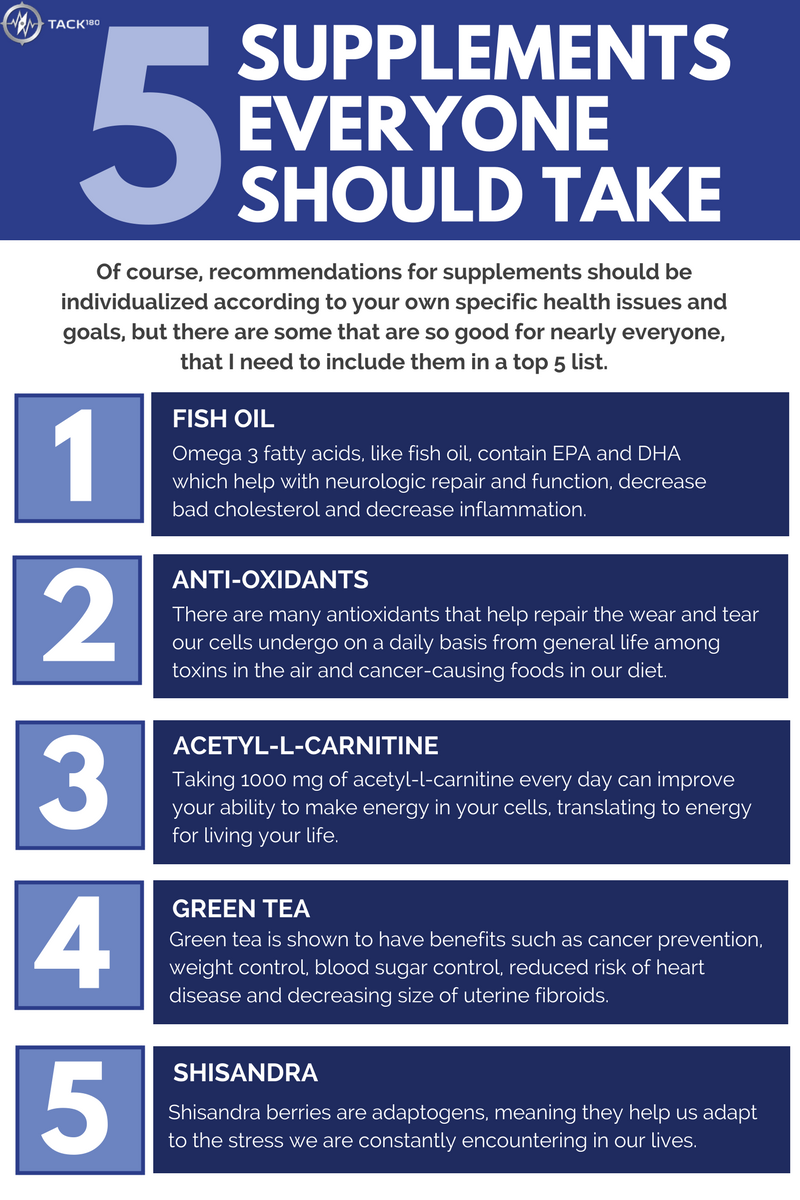In the post below, I explain that certain supplements are good for everybody, though you’ll ideally get individualized recommendations based on your specific health issues and goals. Here are five more supplements that everyone should take. But before I get started, a reminder that nutritional supplements are not regulated closely in the United States, so you have to be careful which brands you buy. I recommend using an objective third party like Consumer Lab, which lists specific brands they have independently tested for quality, to help you choose a safe and effective product. Also, remember to always check with your healthcare practitioner to make sure any supplement you are considering is safe for you given your medical conditions and medications.
B Complex
B vitamins—thiamin, riboflavin, niacin, pantothenic acid, B-6, biotin, folic acid, and B-12—play an important role in the body’s process of converting protein and sugar to energy as well as the repair and production of cells. For this reason, it’s especially important that fitness enthusiasts get enough B vitamins. A <study published in the International Journal of Sport Nutrition and Exercise Metabolism found athletes and other active people who lack B vitamins may not perform as well during high intensity exercise and have a decreased ability to repair and build muscle compared to those with nutrient-rich diets. To make sure you’re getting the most bang for your buck, look for methylated forms of B vitamins that your body can absorb and use more readily.
Vitamin D
This one also makes my list of top supplements for heart health, and with good reason. Studies have shown a strong association between vitamin D deficiency—a common condition in the United States and worldwide—and risk of cardiovascular disease. And a recent analysis by Johns Hopkins of survey responses and health records of more than 10,000 American adults for nearly 20 years found a link between adequate vitamin D levels and exercise in reducing heart attack and stroke risk.
Ashwagandha
This herb is what’s called an adaptogen, and it possesses a unique ability to help the body adapt to stress. They work to provide balance, acting according to what you need. Feeling anxious? Adaptogens help calm you. Tired? They help energize you. They can even do both at the same time! Regardless of which way you’re swinging, adaptogens can bring you back to the center, all without disrupting normal biological function. They increase our ability to cope with and respond to whatever comes our way, which is something we can probably all use more of in these stressful times. In a study looking at the effect of ashwagandha on individuals with a history of chronic stress, those who took ashwagandha capsules twice a day for 60 days had their stress and cortisol levels significantly lowered compared to a placebo group.
Turmeric
This bright yellow spice is a popular supplement thanks to a powerfully anti-inflammatory and antioxidant active constituent called curcumin. Research suggests turmeric has the potential to treat a wide array of health conditions. In a study of patients with osteoarthritis in one or both knees, those who took a turmeric formulation for 90 days showed a 58 percent reduction in overall pain and stiffness compared to controls. Curcumin found in turmeric has also been shown to relieve the symptoms of inflammatory bowel disease (IBD). In one study, participants with ulcerative colitis who took curcumin along with medication experienced significant relief compared to those who took a placebo and medication. And a data analysis looking at studies of curcumin for IBD found it has potential as an adjunct therapy as well as on its own.
L-Theanine
I include this one on my list of top brain supplements as well. A compound found in black and green tea, L-theanine on its own can bring about a state of relaxed alertness. When paired with caffeine, it works synergistically to increase memory and improve reaction time. The beauty of L-theanine lies in its ability to relax you and help you focus at the same time. One systematic review found L-theanine simultaneously reduced anxiety and increased attention.
5 Supplements Everyone Should Take
(Posted in 2017)
Of course, recommendations for supplements should be individualized according to your own specific health issues and goals, but there are some that are so good for nearly everyone, that I need to include them in a top 5 list. The first thing to keep in mind is that nutritional supplements are not regulated closely in the United States, so you have to be careful which brands you buy. Not all supplements have the ingredients they list on the label. Some even have adulterations with pharmaceuticals and heavy metals. In 2015, the New York State attorney general investigated supplements and fund that store-brand supplements from four national retailers – GNC, Target, Walgreens, and Wal-Mart – had some that contained none of the herbs listed on the label and many had potential allergens not identified on the ingredients list. Men are the primary consumers of two of the three categories of products: bodybuilding and sexual enhancing agents, that are most commonly adulterated in the marketplace. The third category that is most commonly adulterated is weight loss supplements, used widely by both women and men. I recommend using an objective third party as a resource for which brands are trustworthy. For example, Consumer Lab lists specific brands they have independently tested for quality.
Now, let’s get into the details of the top 5 supplements everyone should take. Always check with your healthcare practitioner to make sure any supplement you are considering is safe for you given your medical conditions and medications.
Fish Oil
Omega 3 fatty acids, like fish oil, contain EPA and DHA which help with neurologic repair and function, decrease bad cholesterol and decrease inflammation. Plus, these fatty acids help with depression. The usual dose is 2000 mg total of EPA and DHA combined. This can thin blood somewhat, so be cautious if on blood thinners or preparing for any surgical procedures.
Anti-Oxidants
There are many antioxidants that help repair the wear and tear our cells undergo on a daily basis from general life among toxins in the air and cancer-causing foods in our diet. I like NAC (N- acetyl cysteine) because it gets converted to glutathione, a powerful antioxidant.
Acetyl-l-carnitine
Who remembers the Krebs cycle? This cycle powers everything in our body, by converting food (glucose molecules) into energy (ATP). L-carnitine is an important and often depleted enzyme in this process that takes place in our mitochondria. Taking 1000 mg of acetyl-l-carnitine every day can improve your ability to make energy in your cells, translating to energy for living your life.
Green Tea
Many supplements that claim to have the active ingredient in green tea (EGCG) actually have very little, so it’s best to drink your green tea hot. If you do, you can benefit from the many health benefits that have been shown to come from the catechins in green tea such as cancer prevention, weight control, blood sugar control, reduced risk of heart disease and decreasing size of uterine fibroids.
Shisandra
Shisandra berries are adaptogens, meaning they help us adapt to the stress we are constantly encountering in our lives. This extract has been shown to help liver detoxification, fatigue, improve mental function and aid in digestion.
Take a close look at these top 5 to see which might benefit you for your particular health issues There are many more herbal and natural supplements that will be discussed in future webinars and blog posts, but with these 5, you have a great start at better health.
You can download my infographic as a quick reference:

Wondering what others areas of your health could use your attention? Consider taking my Optimal Men’s Health quiz. It’s designed to help you determine your next best step to getting healthier and closer to winning.
Myles Spar, MD, MPH is board-certified in Internal Medicine and in Integrative Medicine. As a clinician, teacher and researcher on faculty of two major medical centers, he has led the charge for a more proactive, holistic and personalized approach to care that focuses on cutting edge technology and preventative care. Dr. Spar has traveled with the NBA, presented a TEDx Talk, appeared on Dr. Oz, and been featured in publications such as the Men’s Journal and the Los Angeles Times.


